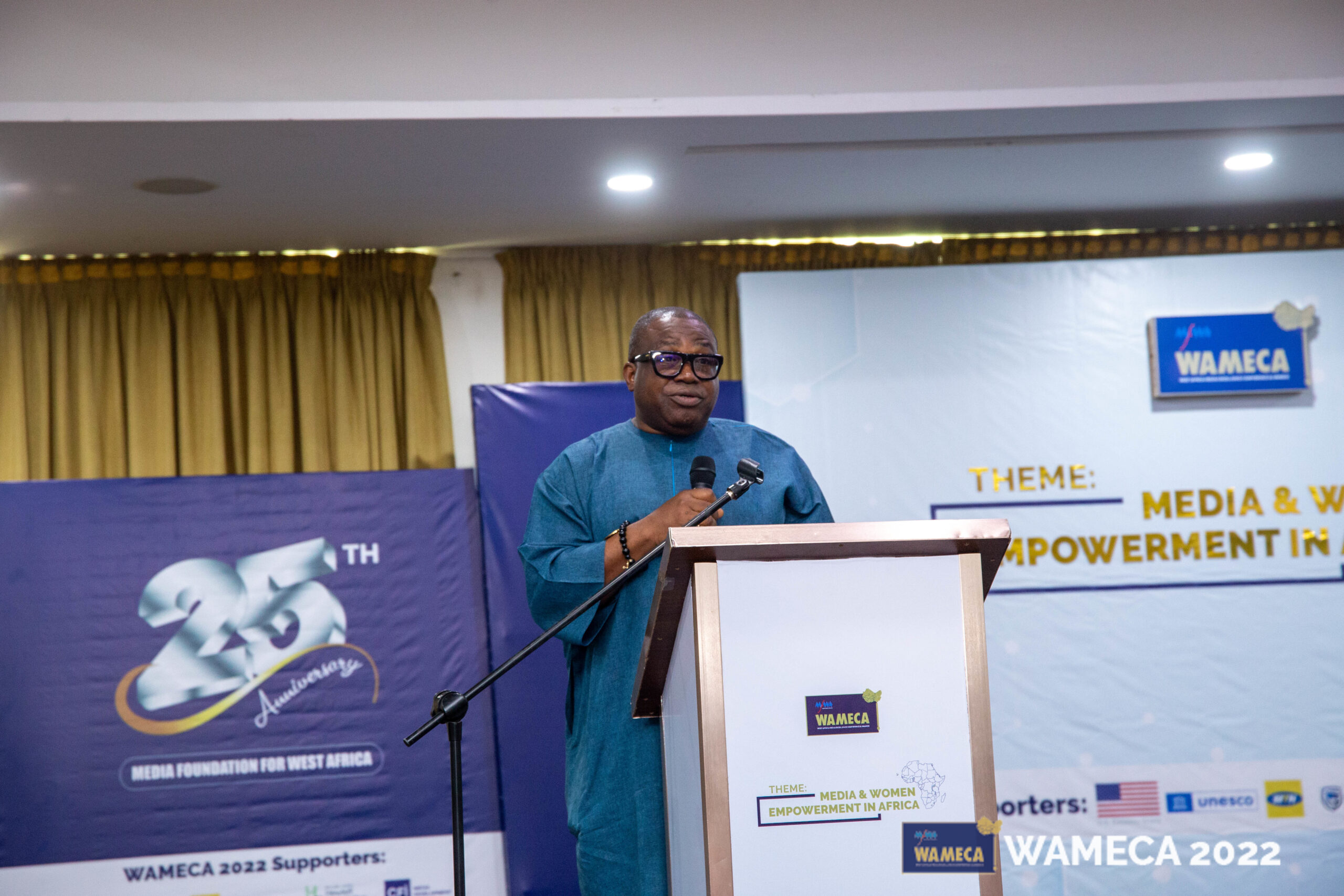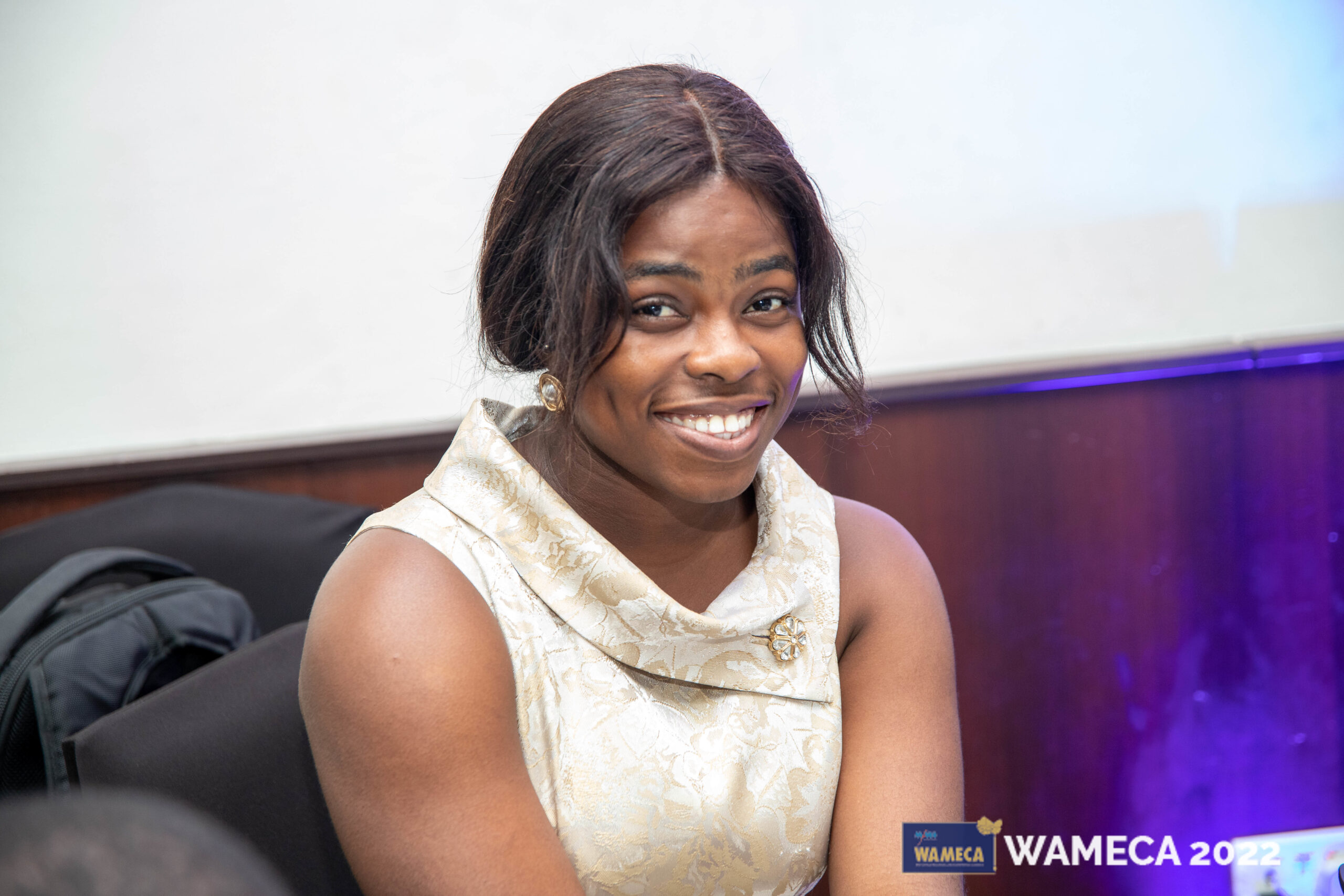Victoria Enyonam Adonu, a fellow of the 2022 Next Generation Investigative Journalism (NGIJ) Fellowship, while under training for the NGIJ fellowship, participated in this year’s WAMECA. In this piece, she explains how both events (NGIJ & WAMECA) have deepened her commitment to excellent journalism.
“Are you one of the managers?” He asked as he unfolded a green napkin on the round table while reclining on the wooden chair.
“Mmmhm…tell me. Are you one of the five female managers at Media Foundation,” he asked again as though clarifying the question would inform my answer.
I burst into peals of laughter. “No ooo, no please I’m not one of them”. It was a coy response that didn’t need any verification. But I thought, “why that conversation starter?”. I wondered how obvious it was that I was part of the MFWA family.
Earlier in the day, the Executive Director of the Media Foundation for West Africa, Sulemana Braimah, had touted how five women were leading the MFWA to greater heights. It was not surprising then that one would inquire about the five impactful women.
“Okay, tell me then, what are you?” He probed.
“I am an investigative journalism fellow at the Media Foundation for West Africa, just that,” I stressed to enforce that I was not more than what I had told him.
It was Dr Emmanuel Eyesan Okorodudu, the head of the Democracy and Good Governance, Public Affairs Directorate at ECOWAS Commission, who sat to my right on the table. It was easy for me to make him out and recall his name because I had consistently tweeted a lot of the ideas he shared during a presentation he delivered earlier. But it wasn’t just my phone that had registered his name, my ears had done that too, thanks to the West African Media Excellence Conference and Awards (WAMECA) 2022.

WAMECA brought media experts to deliberate on press freedom, women and media development issues in West Africa. The climax of WAMECA also honoured outstanding journalists in West Africa for their diligence and great journalistic works that were impacting their countries.
Dr Okorodudu’s head went back and forth as if to nod in agreement or amazement. That nod was followed faint by a smile and a remark, “That is interesting. That is good. You know, it is a good thing. So why investigative journalism and how is your training going?”
I told him about how the team at MFWA is grooming us to hold the government accountable and do impactful journalism that can transform society. I told him about the training and the experience, and he listened keenly as I briefly walked him through my Next Generation of Investigative Journalism (NGIJ) journey.
What started as a conversation between the two of us on the table of eight in the Bamfo Hall of the Alisa Hotel in Accra, soon became a round table discussion that involved every member of our table weaving into the conversation.
I walked out of Hall feeling satisfied. Not just with food but also from thrilling and wisdom-filled conversations at the table and the pleasure of interacting with other journalists from Liberia, Nigeria, and Ghana.
But his pieces of advice on work ethics, life and faith reechoed in my heart. “There is a lot you can learn from ‘older’ women. They are a hub of wisdom. If you listen to them, you cannot make the mistakes they made. You will save yourself a lot.” Talking about older women and their experiences, it happened that WAMECA 2022 was themed on the media and women empowerment in Africa. So, at this point, it was just a matter of “Let she who has ears listen to Okorodudu.”
The women who run affairs
WAMECA offered me the opportunity to meet with and listen to female journalists and other women from Africa share their experiences. I loved the first and last panel discussions in particular. When the conversation on “Ensuring Equal Voices, Representation and Participation in Governance” started the panel discussion, I remember saying to myself, “What a place to be”. Both the atmosphere and people were charged; different perspectives, emotions and experiences clashed. This made me feel it was possible for women to be given a platform to express themselves freely without discrimination. I was excited to be part of the NGIJ, which afforded me a seat at such an inspiring conversation with women who win in a world where women are “disadvantaged”. My greatest joy was seeing women spearhead the conversations and talk about the media.
When Barrister Ebere Ifendu, President of Women in Politics Forum, Nigeria, mentioned that the media must project the qualities of women the way they do for men, I felt that was a lot of work women journalists in particular need to do. I resolved to be more cautious of how I represent or frame women in any story. The last panel discussion on “Women in Arts – Pushing through the barriers in the Creative Arts Industry” was equally interesting.
The experience was a good start for me as a journalist in Africa. WAMECA 2022, was for me, a time to learn, unlearn, and relearn knowing very well “the palest ink is mightier than the sharpest memory”. I penned down a few nuggets I could turn to anytime I want to relive the memories.
My Key Learning from WAMECA 2022
- “The building of better societies would begin with the empowerment of women. We, therefore, cannot build a better world by continuing the old practice of being dominated and overwhelmed by the voices, power and ideas of only the group of people called men.” – Sulemana Braimah, Executive Director of MFWA.
- “Let us also be deliberate about looking out for talented young women who have the potential to rise to the top. Let us serve as their mentors and provide them with encouragement in order to achieve their dreams.” – Samira Bawumia, Second Lady of the Republic of Ghana.
- “We need to make articles about women captivating in order to grab the public’s attention.” – Evan Mensah, Head of Political Desk, Joy News.
- “For the media to be relevant and receive support, they must strive to uphold the high standards of professionalism and fight against the cheap but attractive path of unprofessional conduct. That is the only way self-respecting journalists and responsible media organisations can and will earn back the people’s trust and confidence”. – Prof Kwame Karikari.
- “Believe in your talent so much that when somebody tells you, he will give you the opportunity to perform before the Queen, tell him, you don’t want it.” – Jacinta Ocansey, Standup comedian.
- “As a journalist, your story can still be short and in-depth” – Joseph Wanguru.
The Awards Night and My Lurking Desire
Since WAMECA was initiated, a female had never emerged the overall best journalist until that Saturday. History was made, and Tessy Imogu, a Nigerian investigative journalist set the pace. I couldn’t stop smiling and applauding her.
When I handed over the plaques and certificates to be presented to the finalists and awardees, I was constantly reminded of excellence and the rewards that comes with it. In the silence of my heart, I prayed that sooner or later, I would become a Tessy Imogu who tells a story of how daring and bold a woman can be amidst opposition.
The Journey Continues
WAMECA is one of the many good things by the MFWA that helps people overcome the hurdles on their path to building a successful journalism career. I am glad I was part of WAMECA 2022. It did me good, thanks to NGIJ.






